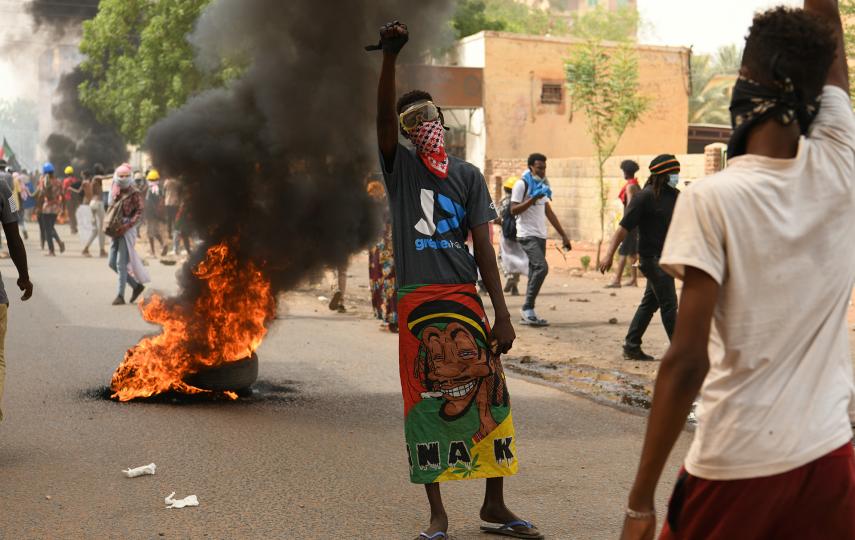The city is dark and full of tragedy. There has been no electricity and limited water, bread, and fuel. Corpses have been left strewn across roads and sidewalks. There has been no safe way to bury them as fighting has raged.
My city, Khartoum, is no stranger to protests and unrest, but it has long been insulated from war. Yet since 15 April, millions have been stuck in the middle of a battle between Sudan’s most powerful generals. The battle is destroying one of Africa’s largest capitals.
A 72-hour truce was agreed yesterday by the warring parties after mediation from the United States and Saudi Arabia, but shelling and gunfire has been reported this morning and people remain shell-shocked.
“This is not Kabul or Mogadishu, it is not even Darfur or another warzone in Sudan,” Ahmed Elmamoun, a pro-democracy activist told me, capturing the mood. “This is Khartoum, believe it or not.”
‘I am a normal citizen and have no trouble with anybody’
For over a week, I have been documenting this unprecedented fighting while also trying to escape it. I have spoken with health workers, local activists, and victims of the situation, which was long predicted by Sudanese analysts and civil society.
Hundreds of people have died already, and the bombs have not differentiated between adults and children. UNICEF disclosed that at least nine children had been killed just in the first few days of fighting.
One of them was Wafi Nadir, the seven-year-old son of Nadir Jubara, who I interviewed last week. Wafi was killed on the fourth day of the war as he and his father drove through a neighbourhood in western Khartoum, Jubara told me.
The father said they were struck by a bomb thrown out of an army aeroplane. He said the target was fighters from the paramilitary Rapid Support Forces (the group battling the army) but the strike was done in a “random” way.
“In the streets around Khartoum international airport, corpses of soldiers were stranded for more than 24 hours until an army vehicle came and took them.”
“I am a normal citizen and have no trouble with anybody,” Jubara said. “Why did I lose my son in this meaningless power struggle between al-Burhan and Hemedti (the two generals fighting the war)?”
All the other eyewitnesses I have spoken to over the past few days from different neighbourhoods in the city have described similar scenes of destruction and desperation.
Even the bodies of dead soldiers have been left rotting, according to Elmamoun. “In the streets around Khartoum international airport, corpses of soldiers were stranded for more than 24 hours until an army vehicle came and took them,” he said.
‘They are occupying the hospital’
Masses of people are now escaping Khartoum, with many beginning exhausting journeys north to the Egyptian border, or northeast to the Red Sea city of Port Sudan. But transport costs are rising fast and cash is scarce.
People have seen little respite over the past 11 days as the army has dropped bombs, and the RSF has planted itself into civilian neighbourhoods. Ceasefire plans have fallen apart, even as the humanitarian situation has worsened.
Last Thursday, a partial truce allowed wealthier people to stock up on food, water, and medicine. But poorer people in this already expensive city have been left to their fate.
Thankfully, there’s help on hand. Mutual aid networks, including resistance committees – the neighbourhood activist groups at the forefront of pro-democracy protests – have been organising assistance and helping people escape front line areas.
Yet support is massively lacking, especially in hospitals, which I have been ringing round over the past week. They are on the brink of collapse and have called for urgent intervention from international humanitarian organisations.
Sara Mohamed, a member of the Central Committee of Sudanese Doctors, told me that many hospitals are now “out of coverage”, having come under fire or due to a lack of medicine, staff, and electricity.
Mustafa Ahmed, a Khartoum doctor, said RSF fighters took over his hospital by force on the second day of the clashes. He said they expelled patients and told medics to start treating their fighters.
“So far, they are occupying the hospital,” Ahmed explained. “Its location is strategic for them, near where they also have an important camp and are continuing to fight the army.”
Street fighting and a broken heart
Despite last night’s ceasefire, the fighting – which has also spread to other parts of the country – is unlikely to end any time soon, a local military analyst told me requesting anonymity due to the security risks.
The analyst said the Sudanese Armed Forces (SAF) has aerial power that the RSF lacks. For that reason, the paramilitary force is trying to draw the army into pitched battles.
“The RSF has pulled the SAF into street fighting, including barricading entire streets, deploying checkpoints, and shooting randomly from above their military vehicles,” the analyst said.
If conflict continues, I fear more deaths like the son of Juraba, whose words have left a mark on me: “In these days, at the end of Ramadan, when God listens to everybody, I ask God to bring my rights because my heart has been broken,” he told me.
Edited by Philip Kleinfeld.






